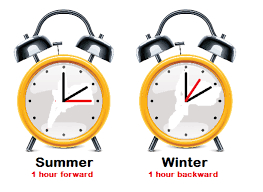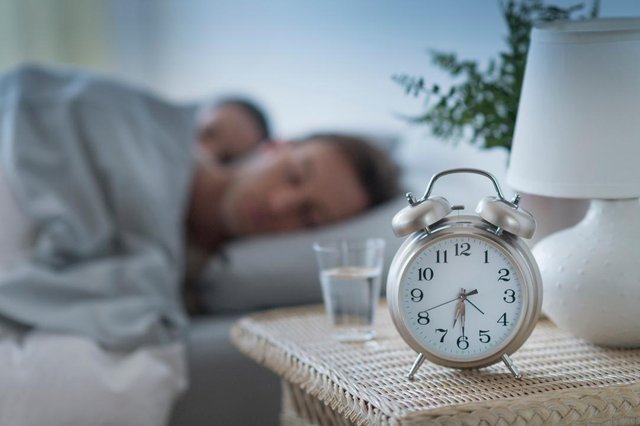Summer time ⏰
Summer time

For several years, some have wondered whether it is always necessary to change the time twice a year.
At this time, MEPs should ask the European Commission to put an end to the change of time that comes twice a year.
The Parliament explains that in response to citizen initiatives and petitions which mention the health concerns related to the effects of the change of time, a draft resolution of the Committee on Transport calls on the European Commission to propose to put a term.
The debate took place in Parliament, with a vote in the wake of this resolution.
The cards are now in the hands of the European Commission.
In any case, the next change of time is scheduled for March 25, 2018: 2am, it will be actually 3h.
Daylight Saving Time is a system of adjusting the official local time, adding one hour to the so-called normal time zone, which prevails in winter, usually from early spring to mid-fall. which has the effect of delaying the time when the sun rises and sets.
Daylight saving time is mainly used in temperate regions, where seasonal variations in luminosity make this measurement relevant. For Europe, the period runs from the last Sunday in March to the last Sunday in October. For North America, and since 2007, this summer period begins on the night of the second Sunday in March, while the return to winter time is the first Sunday in November.
History
On April 26, 1784, Benjamin Franklin evokes for the first time the possibility of shifting schedules to save energy. The idea, however, remains unfulfilled and is not renewed until 1907 by the British William Willet, who is starting a campaign against the waste of light. Germany is the first to introduce this change of time on April 30, 1916 and is quickly followed by the United Kingdom on May 21, 1916, then by France on June 14, 1916. The United States also adopts the change of hour in 1918.
On March 28, 1976, after the oil shock of 1973, summer time is restored: it is about saving energy by reducing lighting needs in the evening. The measure must first be provisional and only last during the oil shock.
The change of summer time is introduced in all European Union countries in the early 1980s. To facilitate transport, communications and exchanges within the EU, it was decided to harmonize dates of change of time in 1998, by Directive 2000/84 / EC of the European Parliament and of the Council of the European Union.
Effect on health
The effect of time change on health is overall negative.
Recent studies show that the advancement of the spring time, which delays the secretion of melatonin, the sleep hormone, can reduce sleep time transiently and thus increase the number and severity of heart attacks during at least seven days after the change of time and increase the frequency of accidents at work and traffic. Changing the time causes, among other things, disturbances of sleep and attention. Children and the elderly are particularly affected and take about a week to adapt to new schedules.
Beyond the transitional phase of adaptation to the new schedule, late sunset in summer can make falling asleep more difficult.

The change of time would also influence suicides, indeed, a rise in suicide and consumption of sleeping pills has been observed in France since the oil crisis and the introduction of summer time. The hypothesis of a causal link between these two events has been advanced. It is this argument that led Russia to abandon the periodic change of time in 2011.
However, the French government considers that no correlation isolating the different parameters can put into question the device of the summer time. as a factor of suicide, the increase in suicides following the oil crisis was mainly due to the social effects of the economic crisis that followed.
Repeal of the time change
The repeal of the change of time is sometimes advocated. The report of the French Senate of 1997 advocated adopting UTC + 1 throughout the year and argued that if neighboring countries maintained the current regime, this would result in giving France the time of Germany during winter and UK time during the summer. It is this constant time that prevailed for the majority of European countries between 1945 and 1976.
In Russia, the periodic change of time in spring and autumn, which had been introduced on April 1, 1981, was officially repealed by decree of President of the Russian Federation Dmitry Medvedev in February 2011. The decision of President Medvedev was based on the permanent hostility of the population to the change of time, on a vote of the Duma, and on the advice of scientists and experts interviewed by the executive. Russia remained in summer time all year for three years. In 2014, however, during the night of October 25 to October 26, Russia decided to make another change of time. It was not a matter of reinstating a periodic time change but simply of returning to winter time all year round.
In the United States, the state of Alaska retains the time change. The abolition proposal was passed at first reading by the House of Representatives on March 27, 2009, but was finally rejected in April 2010. The state of Utah retains the time change. A bill was introduced in January 2012 by Republican Jim Nielson, but was rejected on February 7, 2012.
In Tunisia, summer time, reinstated in 2006, was repealed from 2008 with effect in March 2009. Rather than change the legal time, Tunisia prefers to change the hours of activity in summer, to save energy and promoting adaptation to summer heat: most Tunisians work six days a week in summer, from about 7:00 am to 1:30 pm.
In Brazil, 32 municipalities of Mato Grosso did not make the change of time scheduled on October 15, 2011 in the rest of Brazil.
In Canada, a petition is tabled in the National Assembly of the Province of Quebec to abolish the time change in May 2013. On June 12, the Minister of Health Réjean Hébert rejects the proposal because the current state of knowledge does not allow them to demonstrate that the benefits of abolishing the time change are significant enough to offset the disadvantages of maintaining it.
In Turkey, the time change was abandoned in 2016 by decision of the Turkish Cabinet of 7 September 2016 following the decision of the Minister of Energy and Natural Resources dated 6 September 201.
Personally I am for the stop of the periodical change of time, indeed, I think that this change of rhythm as well at the level of the sleep as of the meals has a negative impact on our organization and that of our children.
Ah what did you make me remember. When I was in School I would always be like why do they adjust time i will have to wake up early bow😃
Hey.)
I will be glad to meet you
my profile pays rewards from 50-70% for app)
subscribe and I will be glad to communicate with everyone
Ah what did you make me remember. When I was in School I would always be like why do they adjust time i will have to wake up early now😃
@suf1an i am laughing here seriously. Although the post takes a little drift off, but it only brings up in me a reminiscence of my childhood days when the time-adjustment tactics was used to train me in the discourse of time management.
Yeah exactlyyy, you are right. Now we know it was good for us but at that time, this news was enoug to ruin your whole day.
Arizona in USA is not changing time between Winter and Summer time.
I'm glad, others are considering the same.
I hope soon all would 'see the light' at the same time so to speak ;-)
With the concept of transition to summer time, I'm not familiar by hearsay. Previously, we constantly changed our time to summer and winter. The difference was 1 hour. I will not argue that this was strongly reflected in the daily cycle of wisecracking, but it did not take less than an hour to sleep at least :)
For several years now, we have not translated the time, since it was "canceled".
Earlier I did not think that the translation of time can significantly affect human health - this is interesting information.
Thank you
nice post,, good mass bro
Thank you for the information, it has added to my knowledge
Sleep improves your life drasticly! Cancers have been strongly linked with not enough sleep. Sleeping 7-9 hours is the best way to go. I ussualy go for 8 hours.
we have got such rule once in 2008 that we were changing the time about one hour in summer and again get back to one hour in winter
Good post
I understand why countries like UK, Sweden and Norway have to change their time, because otherwise they will have dark almost at midday, and light much earlier.
But cases like here in Portugal, in my opinion is doesn´t make much sense, because there is almost no difference, and now you scared me with the problems associated with the advancement of the spring time, if it is negative for health why would we keep doing it?
Restrict that time changes to the countries that really make sense.
it's nice if its dark what's bad about darkness?